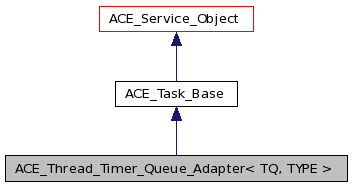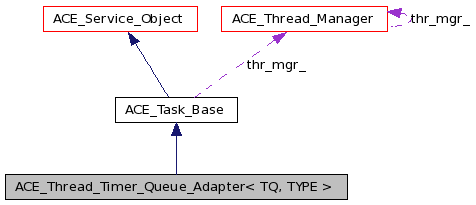Adapts an ACE timer queue using a separate thread for dispatching. More...
#include <Timer_Queue_Adapters.h>


Public Types | |
| typedef TQ | TIMER_QUEUE |
| Trait for the underlying queue type. | |
Public Member Functions | |
| ACE_Thread_Timer_Queue_Adapter (ACE_Thread_Manager *=ACE_Thread_Manager::instance(), TQ *timer_queue=0) | |
| virtual | ~ACE_Thread_Timer_Queue_Adapter (void) |
| Destructor. | |
| long | schedule (TYPE handler, const void *act, const ACE_Time_Value &future_time, const ACE_Time_Value &interval=ACE_Time_Value::zero) |
| int | cancel (long timer_id, const void **act=0) |
| virtual int | svc (void) |
| Runs the dispatching thread. | |
| virtual void | deactivate (void) |
| Inform the dispatching thread that it should terminate. | |
| ACE_SYNCH_RECURSIVE_MUTEX & | mutex (void) |
| Access the locking mechanism, useful for iteration. | |
| int | timer_queue (TQ *tq) |
| Set a user-specified timer queue. | |
| TQ * | timer_queue (void) const |
| Return the current <TQ>. | |
| ACE_thread_t | thr_id (void) const |
| Return the thread id of our active object. | |
| virtual int | activate (long flags=THR_NEW_LWP|THR_JOINABLE, int n_threads=1, int force_active=0, long priority=ACE_DEFAULT_THREAD_PRIORITY, int grp_id=-1, ACE_Task_Base *task=0, ACE_hthread_t thread_handles[]=0, void *stack[]=0, size_t stack_size[]=0, ACE_thread_t thread_ids[]=0, const char *thr_name[]=0) |
Private Attributes | |
| TQ * | timer_queue_ |
| The underlying Timer_Queue. | |
| bool | delete_timer_queue_ |
| ACE_SYNCH_RECURSIVE_MUTEX | mutex_ |
| ACE_SYNCH_RECURSIVE_CONDITION | condition_ |
| bool | active_ |
| ACE_thread_t | thr_id_ |
| Thread id of our active object task. | |
Adapts an ACE timer queue using a separate thread for dispatching.
This implementation uses a separate thread to dispatch the timers. The base queue need not be thread safe; this class takes all the necessary locks.
Definition at line 123 of file Timer_Queue_Adapters.h.
| typedef TQ ACE_Thread_Timer_Queue_Adapter< TQ, TYPE >::TIMER_QUEUE |
Trait for the underlying queue type.
Definition at line 127 of file Timer_Queue_Adapters.h.
| ACE_Thread_Timer_Queue_Adapter< TQ, TYPE >::ACE_Thread_Timer_Queue_Adapter | ( | ACE_Thread_Manager * | tm = ACE_Thread_Manager::instance (), |
|
| TQ * | timer_queue = 0 | |||
| ) |
Creates the timer queue. Activation of the task is the user's responsibility. Optionally a pointer to a timer queue can be passed, when no pointer is passed, a TQ is dynamically created
Definition at line 158 of file Timer_Queue_Adapters.cpp.
: ACE_Task_Base (tm), timer_queue_(timer_queue), delete_timer_queue_(false), condition_ (mutex_), active_ (true), // Assume that we start in active mode. thr_id_ (ACE_OS::NULL_thread) { if (timer_queue_ == 0) { ACE_NEW (this->timer_queue_, TQ); this->delete_timer_queue_ = true; } }
| ACE_Thread_Timer_Queue_Adapter< TQ, TYPE >::~ACE_Thread_Timer_Queue_Adapter | ( | void | ) | [virtual] |
Destructor.
Definition at line 176 of file Timer_Queue_Adapters.cpp.
{
if (this->delete_timer_queue_)
{
delete this->timer_queue_;
this->timer_queue_ = 0;
this->delete_timer_queue_ = false;
}
}
| int ACE_Thread_Timer_Queue_Adapter< TQ, TYPE >::activate | ( | long | flags = THR_NEW_LWP | THR_JOINABLE, |
|
| int | n_threads = 1, |
|||
| int | force_active = 0, |
|||
| long | priority = ACE_DEFAULT_THREAD_PRIORITY, |
|||
| int | grp_id = -1, |
|||
| ACE_Task_Base * | task = 0, |
|||
| ACE_hthread_t | thread_handles[] = 0, |
|||
| void * | stack[] = 0, |
|||
| size_t | stack_size[] = 0, |
|||
| ACE_thread_t | thread_ids[] = 0, |
|||
| const char * | thr_name[] = 0 | |||
| ) | [virtual] |
We override the default activate() method so that we can ensure that only a single thread is ever spawned. Otherwise, too many weird things can happen...
Reimplemented from ACE_Task_Base.
Definition at line 294 of file Timer_Queue_Adapters.cpp.
{
// Make sure to set this flag in case we were deactivated earlier.
this->active_ = true;
// Make sure that we only allow a single thread to be spawned for
// our adapter. Otherwise, too many weird things can happen.
return ACE_Task_Base::activate (flags, 1, 0, priority, grp_id, task, 0,
stack, stack_size, thread_ids, thr_name);
}
| int ACE_Thread_Timer_Queue_Adapter< TQ, TYPE >::cancel | ( | long | timer_id, | |
| const void ** | act = 0 | |||
| ) |
Cancel the timer_id and return the act parameter if an address is passed in. Also wakes up the dispatching thread.
Definition at line 207 of file Timer_Queue_Adapters.cpp.
{
ACE_GUARD_RETURN (ACE_SYNCH_RECURSIVE_MUTEX, guard, this->mutex_, -1);
int result = this->timer_queue_->cancel (timer_id, act);
condition_.signal ();
return result;
}
| void ACE_Thread_Timer_Queue_Adapter< TQ, TYPE >::deactivate | ( | void | ) | [virtual] |
Inform the dispatching thread that it should terminate.
Definition at line 218 of file Timer_Queue_Adapters.cpp.
{
ACE_GUARD (ACE_SYNCH_RECURSIVE_MUTEX, guard, this->mutex_);
this->active_ = false;
this->condition_.signal ();
}
| ACE_SYNCH_RECURSIVE_MUTEX & ACE_Thread_Timer_Queue_Adapter< TQ, TYPE >::mutex | ( | void | ) |
Access the locking mechanism, useful for iteration.
Definition at line 187 of file Timer_Queue_Adapters.cpp.
{
return this->mutex_;
}
| long ACE_Thread_Timer_Queue_Adapter< TQ, TYPE >::schedule | ( | TYPE | handler, | |
| const void * | act, | |||
| const ACE_Time_Value & | future_time, | |||
| const ACE_Time_Value & | interval = ACE_Time_Value::zero | |||
| ) |
Schedule the timer according to the semantics of the <TQ>; wakes up the dispatching thread.
Definition at line 194 of file Timer_Queue_Adapters.cpp.
{
ACE_GUARD_RETURN (ACE_SYNCH_RECURSIVE_MUTEX, guard, this->mutex_, -1);
long result = this->timer_queue_->schedule (handler, act, future_time, interval);
this->condition_.signal ();
return result;
}
| int ACE_Thread_Timer_Queue_Adapter< TQ, TYPE >::svc | ( | void | ) | [virtual] |
Runs the dispatching thread.
Reimplemented from ACE_Task_Base.
Definition at line 227 of file Timer_Queue_Adapters.cpp.
{
ACE_GUARD_RETURN (ACE_SYNCH_RECURSIVE_MUTEX, guard, this->mutex_, -1);
this->thr_id_ = ACE_Thread::self ();
// Thread cancellation point, if ACE supports it.
//
// Note: This call generates a warning under Solaris because the header
// file /usr/include/pthread.h redefines the routine argument. This
// is a bug in the Solaris header files and has nothing to do with
// ACE.
# if !defined (ACE_LACKS_PTHREAD_CANCEL)
ACE_PTHREAD_CLEANUP_PUSH (&this->condition_.mutex ().get_nesting_mutex ());
# endif /* ACE_LACKS_PTHREAD_CANCEL */
while (this->active_)
{
# if defined (ACE_HAS_DEFERRED_TIMER_COMMANDS)
// Temporarily suspend ownership of the timer queue mutex in
// order to dispatch deferred execution commands. These
// commands are to be treated as executing in a context
// "external" to the timer queue adapter, and thus must compete
// separately for this lock.
mutex_.release ();
this->dispatch_commands ();
// Re-acquire ownership of the timer queue mutex in order to
// restore the "internal" timer queue adapter context
mutex_.acquire ();
# endif /* ACE_HAS_DEFERRED_TIMER_COMMANDS */
// If the queue is empty, sleep until there is a change on it.
if (this->timer_queue_->is_empty ())
this->condition_.wait ();
else
{
// Compute the remaining time, being careful not to sleep
// for "negative" amounts of time.
ACE_Time_Value const tv_curr = this->timer_queue_->gettimeofday ();
ACE_Time_Value const tv_earl = this->timer_queue_->earliest_time ();
if (tv_earl > tv_curr)
{
// The earliest time on the Timer_Queue is in future, so
// use ACE_OS::gettimeofday() to convert the tv to the
// absolute time.
ACE_Time_Value const tv = ACE_OS::gettimeofday () + (tv_earl - tv_curr);
// ACE_DEBUG ((LM_DEBUG, ACE_TEXT ("waiting until %u.%3.3u secs\n"),
// tv.sec(), tv.msec()));
this->condition_.wait (&tv);
}
}
// Expire timers anyway, at worst this is a no-op.
this->timer_queue_->expire ();
}
// Thread cancellation point, if ACE supports it.
# if !defined (ACE_LACKS_PTHREAD_CANCEL)
ACE_PTHREAD_CLEANUP_POP (0);
# endif /* ACE_LACKS_PTHREAD_CANCEL */
return 0;
}
| ACE_thread_t ACE_Thread_Timer_Queue_Adapter< TQ, TYPE >::thr_id | ( | void | ) | const |
Return the thread id of our active object.
Definition at line 24 of file Timer_Queue_Adapters.inl.
{
return this->thr_id_;
}
| int ACE_Thread_Timer_Queue_Adapter< TQ, TYPE >::timer_queue | ( | TQ * | tq | ) |
Set a user-specified timer queue.
Definition at line 14 of file Timer_Queue_Adapters.inl.
{
if (this->delete_timer_queue_)
delete this->timer_queue_;
this->timer_queue_ = tq;
this->delete_timer_queue_ = false;
return 0;
}
| TQ * ACE_Thread_Timer_Queue_Adapter< TQ, TYPE >::timer_queue | ( | void | ) | const |
Return the current <TQ>.
Definition at line 8 of file Timer_Queue_Adapters.inl.
{
return this->timer_queue_;
}
bool ACE_Thread_Timer_Queue_Adapter< TQ, TYPE >::active_ [private] |
When deactivate is called this variable turns to false and the dispatching thread is signalled, to terminate its main loop.
Definition at line 240 of file Timer_Queue_Adapters.h.
ACE_SYNCH_RECURSIVE_CONDITION ACE_Thread_Timer_Queue_Adapter< TQ, TYPE >::condition_ [private] |
The dispatching thread sleeps on this condition while waiting to dispatch the next timer; it is used to wake it up if there is a change on the timer queue.
Definition at line 236 of file Timer_Queue_Adapters.h.
bool ACE_Thread_Timer_Queue_Adapter< TQ, TYPE >::delete_timer_queue_ [private] |
Keeps track of whether we should delete the timer queue (if we didn't create it, then we don't delete it).
Definition at line 225 of file Timer_Queue_Adapters.h.
ACE_SYNCH_RECURSIVE_MUTEX ACE_Thread_Timer_Queue_Adapter< TQ, TYPE >::mutex_ [private] |
The mutual exclusion mechanism that is required to use the <condition_>.
Definition at line 229 of file Timer_Queue_Adapters.h.
ACE_thread_t ACE_Thread_Timer_Queue_Adapter< TQ, TYPE >::thr_id_ [private] |
Thread id of our active object task.
Definition at line 243 of file Timer_Queue_Adapters.h.
TQ* ACE_Thread_Timer_Queue_Adapter< TQ, TYPE >::timer_queue_ [private] |
The underlying Timer_Queue.
Definition at line 221 of file Timer_Queue_Adapters.h.
 1.7.0
1.7.0